We recently released our “Email design and content trends for 2024” guide, brimming with expert insights and recommendations on maximizing these trends.
This post offers highlights and key insights, but for an in-depth exploration, including best practices, delve into the full guide.
Trend 1. Email accessibility: Crafting emails for an inclusive experience
Let's be honest, email accessibility is more a sign of our commitment to all subscribers, as well as a legal obligation and fundamental expectation, rather than a trend in email marketing.
While email marketers create each individual message with care, it's essential to ask whether we are being inclusive of all audiences. Embracing email accessibility is not just “nice”— it’s vital to effective engagement with and respect for all customers, particularly those with visual impairments. As such, we strongly recommend making email accessibility a standard practice.
people worldwide would benefit from accessible emails
These includes
- people who are blind or visually impaired and who use assistive technologies, including screen readers. The World Health Organization (WHO) reports that over 2.2 billion people fall within this category;
- those who are colorblind and have difficulty distinguishing colors. According to Color Blind Awareness, over 300 million people are affected by this condition;
- individuals prone to photosensitive epilepsy, which can trigger seizures. The Epilepsy Society notes that 1 in 100 people on Earth has epilepsy, with a subset experiencing photosensitive epilepsy;
- people with dyslexia who experience challenges with reading. Dyslexia affects 9–12% of the global population, that is approximately every 10th person.

(Source: Daniel Britton)
Research by the Email Markup Consortium shows that 99.97% of emails are not even optimized for screen readers.
But there is good news for Stripo users: All emails built by us are fully optimized for screen readers.
Trend 2. Email personalization: Adding a personal touch to your newsletter
Email personalization is an evergreen email marketing trend, as it remains at the forefront, transforming business–audience engagement. It's more than simply using first names — it involves tailoring content to align with each subscriber’s unique preferences, behaviors, and needs, offering a truly individualized experience.
According to the demandsage studies:
- 85% of businesses say they deliver a personalized experience to their consumers; and
- 60% of consumers think that brands actually personalize their promotional emails.
What does this tell us? I believe it means we need to work harder on how we personalize our emails.
Application of email personalization
In our guide “Email content and design trends,” we discussed this in detail, including tips and recommendations from experts; yet here, we would like to simply list them:
- Personalized subject lines.
- Addressing by name.
- Segmentation
- by geolocation;
- by order history;
- by customers’ preferences;
- by behavioral segmentation.
- Loyalty programs.
- Milestones.
- Localization.
All the above are crucial, but the latter trend in email marketing projected for 2024 — localization — will be discussed next.
Trend 3. Email localization, aka multilingual email marketing
Did you know that 40% of consumers say they will not buy in languages other than their native tongue, and 56% surveyed said they preferred content in their native language over a lower price?
If your business operates across several or more countries, localizing your email marketing is essential. But what does this entail? It involves crafting messages that resonate with each audience, as well as considering unique needs, cultural nuances, and language preferences. For instance, did you know that Australians make snowmen from sand, so it's better to avoid images of traditional snowmen when marketing to them?
By localizing your emails, you:
- boost your email performance;
- improve personalization;
- comply with local regulations;
- improve the customer experience; and
- understand your audience better to remain competitive.
Email localization is a powerful tool, but there are many important considerations to make before its implementation. We’ve conducted thorough research with seasoned email marketing professionals and shared all of our recommendations in our eBook Effective Multilingual Email Marketing, some of which are available in the guide.
Trend 4. Generative artificial intelligence in email marketing is changing the way we work
Initially met with skepticism, generative artificial intelligence (GenAI), including such tools as ChatGPT, has proven a powerful and helpful asset in various fields. Despite early concerns from copywriters and marketers about job security, it is now clear that GenAI complements rather than replaces human efforts. As a testament to its efficiency, 67% of users found it to offer significant time-savings.
of users have found GenAI to be a significant time-saver
Application of GenAI to email marketing
- idea generation and brainstorming: Running out of newsletter ideas? GenAI can suggest engaging topics tailored to your audience demographics or even supply creative game ideas;
- copy enhancement: GenAI refines your existing copy to match your tone, improves clarity, and removes industry jargon. It also identifies content gaps, and it can develop content based on your outlines;
- imagery enhancement: Beyond photo editing tasks, including obstacle removal and background changes, GenAI can enhance photo quality and create new images based on your prompts;
- strategic planning and briefs: GenAI can develop comprehensive email strategies, such as suggesting a series of email ideas, providing briefs, and crafting copy for each email;
- localization: Localization with GenAI goes beyond mere translation. It understands and adapts content to align with the customs and traditions of the global audience, significantly improving communication.
We are currently investigating new ways to maximize the benefits of GenAI — stay tuned!
Trend 5. The winning strategy: Leveraging gamification to boost email interaction
Email gamification turns subscribers’ inboxes into a realm of excitement — it’s about infusing game elements into email content to make it more engaging and to keep customers interested, leading to higher participation.
Key game elements for an exceptional interactive experience:
- achievements: Offer points, badges, and rewards, such as exclusive content or discounts, for completing goals;
- challenge: Introduce leaderboard competitions and progression bars for an added thrill and competitive edge;
- goals: Set clear objectives to guide and motivate subscribers along this adventure;
- rules: Provide structured rules to navigate the gamified journey;
- community: Build connections and a sense of belonging by sharing achievements within a community.
But when is gamification most effective?
- Holiday season: Stand out during the holiday email overload with playful discounts or exclusive content.
- Post-holiday season, when you have no news to share: Use gamification to maintain contact and visibility during slower news periods.
- Budget-friendly engagement: Implement a 'Wheel of Fortune'-style game for varied discounts, balancing engagement and budget.
- Educational content: Make learning fun with quizzes and games, enhancing retention (studies show up to 90% effectiveness in learning through gamification).
- Product launches: Enhance anticipation for product launches or events with gamified teaser emails, proven to boost click-through rates and engagement.
Gamification isn’t just a gimmick; it's a strategic tool for achieving diverse email marketing goals.
Trend 6. Modular email design: Streamlining the email design process
Among all email marketing trends anticipated for 2024, modular email design (modules) is likely fully geared toward email marketers, who will benefit significantly from its ability to reduce email production five fold.
However, modules are more than simply reused components across emails. We view a module as a content unit, within which the design can dissociate from the data, which we call modules+. This approach automatically allows bulk updates of one module in many emails, generating emails based on data feeds and remaining consistent between the design and the company’s brand strategy.
We are all familiar with the benefits of the typical modular email design, but what about modules+?
Key advantages of the modules+ approach in email marketing:
- Bulk updates: Modules+ allows synchronized updates across all emails through modification of just one module, streamlining workflows and ensuring campaign consistency with minimal effort.
- Locked design: Marketers can “lock in” wireframe designs, including image numbers and locations, ensuring stability in design elements during data updates.
- Locked data: By “locking” data within modules, changes to aesthetics, such as button colors and fonts, are possible without altering the core data incorporated into the module.
- Unified content optimization with GenAI: GenAI optimizes the entire module's content, ensuring consistent terms and tone. Above, we’ve already shared that this approach showed a 41.34% increase in the click-to-open rate (CTOR).
- Complex modules creation: Modules+ supports the creation of intricate modules that include AMP content and interactive elements, simplifying the focus on visual aspects without the data management concerns.
- Automated email generation: This method involves populating emails with data from external sources. While some degree of technical expertise might be needed, certain Email Service Providers (ESPs) are developing user interfaces for more independent email building and modification.
Trend 7. BIMI becoming a mandatory practice and email safe space
In October 2023, Gmail and Yahoo announced a collaboration on antispam efforts, introducing common criteria for brands to maintain their good graces. By February 2024, brands must adopt three authentication standards — SPF, DKIM, and DMARC, a move that nudges brands closer to the benefits of Brand Indicators for Message Identification (BIMI).
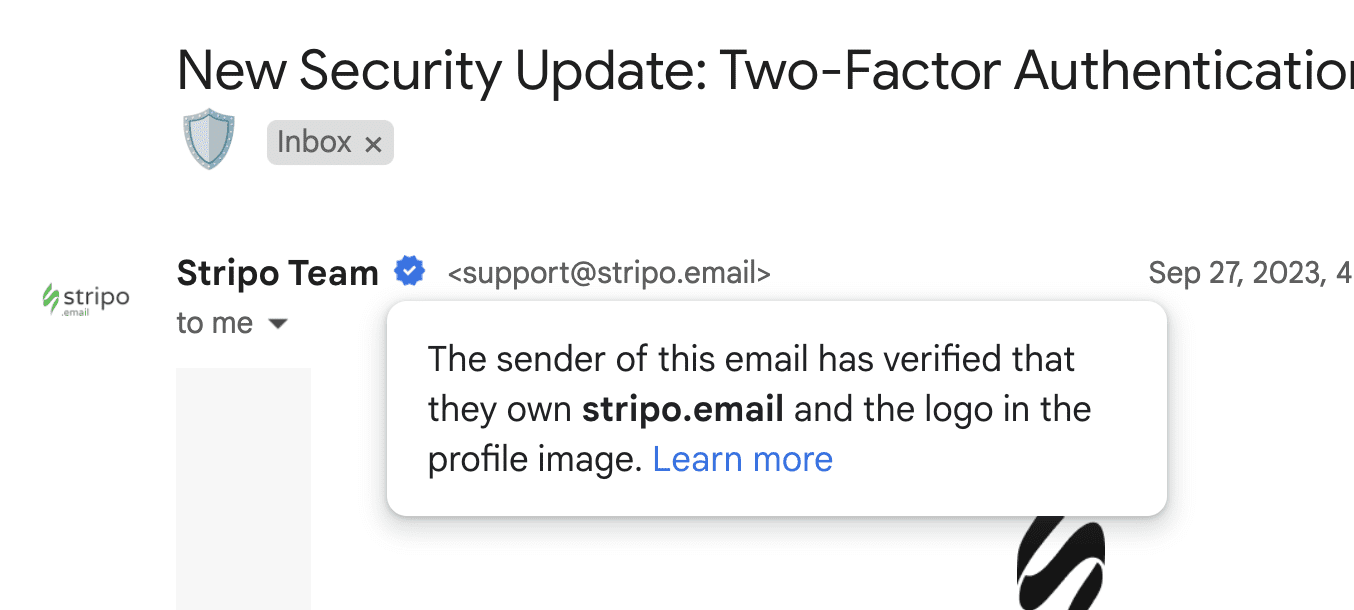
Defining BIMI and its purpose
Stored as a text record on servers, BIMI works alongside SPF, DMARC, and DKIM to confirm the authenticity of brand emails. It allows companies to display their logos in messages, verifying their identity and increasing customer trust.
According to IC3's report by FBI:
- in the United States alone, the potential total loss from cyberattacks and incidents increased from $6.9 billion in 2021 to more than $10.2 billion in 2022;
- the IC3 received 21,832 BEC complaints with adjusted losses of over $2.7 billion, an increase of 12% from 2021 and 628% from 2016.
Key benefits of BIMI include:
- enhanced brand trust and loyalty, showing subscribers a commitment to security;
- increased brand visibility, making emails more noticeable;
- indirect improvement of deliverability through enhanced sender reputation; and
- higher open rates over time, thanks to established trust.
The results of using BIMI
According to data presented at Martech Fest 2023, the implementation of a logo as an avatar and a Gmail blue checkmark, which increases trust, resulted in an OR boost across different BIMI-supported email clients as follows:
- Hotmail.com — 20.32%;
- Gmail.com — 44.09%;
- Msn.com — 17.25%;
- Yahoo.com — 41.04%;
- Average all domains — 29.34%.
Trend 8. Gmail annotations are an updated trend
In 2022, Gmail annotations were rumored to fade, but in March 2023, Gmail revitalized this feature in Promo Tabs with new enhancements. As such, it’s anticipated that brands will further explore its effectiveness in 2024.
Why Gmail annotations are still a trend?
Email annotations for Gmail, or Gmail annotations, allow brands to highlight promotional content directly in the inbox before emails are even opened. This enhances user interaction, increasing open rates (OR) and conversions.
According to Litmus, Gmail's client share is 29.67% as of December 2023, meaning a sizable portion of your subscribers is likely to see these annotations.
Benefits of implementing Gmail annotations
- instant visuals: Subscribers see products and offer previews without opening the email;
- enhanced interactivity: A dynamic, attractive promotional feed encourages immediate action;
- increased engagement: More content visibility draws in more users;
- higher open rates: Noticeable offers boost the likelihood of email opens.
New Gmail annotation features:
- Deal annotation.
- Product carousel, with and without prices and product descriptions under the product snippets.
- Single images.
Trend 9. Dark mode shows your concern for the comfort of your subscribers
of people use dark mode on their smartphones
Recent studies by EarthWeb show that 81.9% smartphone users prefer dark mode on their devices.
This shows that dark mode in email is an increasingly important trend for marketers and designers.
Understanding dark mode
Dark mode uses a darker color palette, ideal for low light or night conditions, featuring light text and UI elements on a dark background. Its popularity stems from several benefits:
- recommended by ophthalmologists;
- eye comfort and considerate in dark environments;
- improved battery life.
Dark mode in email and its challenges
Email clients control the email content's background color scheme, typically switching to dark backgrounds and lighter text shades. While many clients like Apple Mail, Outlook, Gmail, and Yahoo! Mail automatically enable dark mode, default styles may not always preserve the intended design. Therefore, marketers need to embrace dark mode design best practices and test emails thoroughly.
Popular email clients display dark mode differently, creating design challenges:
- no color change: Some clients, like Gmail Web and Apple Mail, don’t alter colors;
- partial color inversion: Clients like the Gmail app and Outlook.com invert light backgrounds and dark text;
- complete color inversion: Others, like Windows Mail and Gmail app (iOS), change both text and background colors.
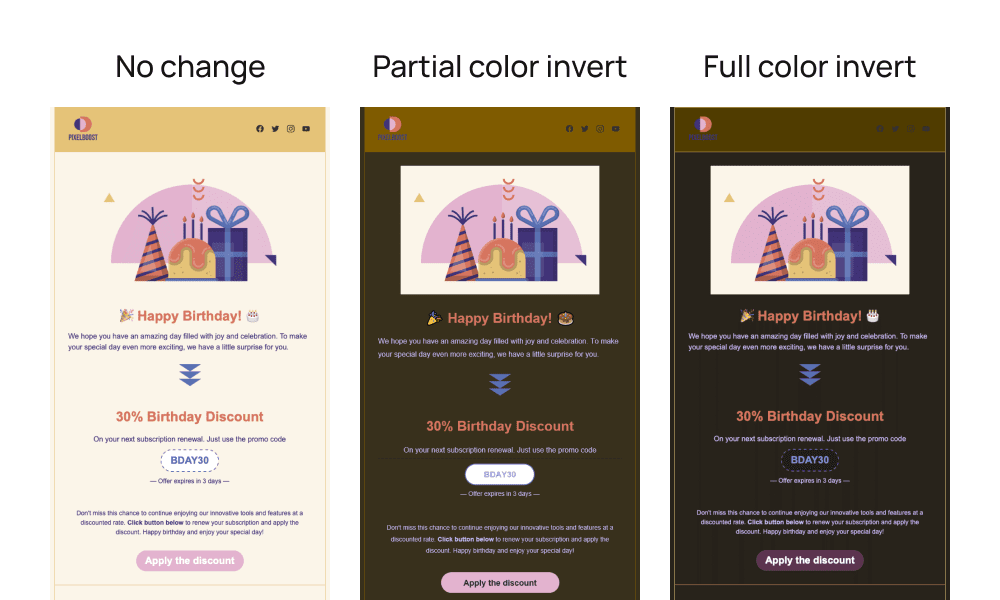
Trend 10. From inbox to heart: The art of storytelling in email marketing
Email marketing has evolved, moving beyond straightforward sales pitches to an emphasis on authentic storytelling. This approach is not just a technique; it's a strategy that transforms emails from basic information delivery to engaging, memorable experiences.
The impact of storytelling in email marketing
- 68% of consumers are heavily influenced by brand stories in their buying decisions;
- brands skilled in storytelling see a 20% increase in customer loyalty.
Application of storytelling in email marketing
- celebrating milestones: Recognize customer life events and share your brand's journey, emphasizing customer loyalty;
- empowering nonprofits: Share compelling stories about your organization's societal impact;
- bringing products to life: Engage users by showcasing customer experiences and the product development journey;
- announcing blog posts: Enhance blog announcements with personal stories to captivate your audience.
Effective email storytelling goes beyond mere information, fostering emotional connections and driving engagement and loyalty.
Wrapping up
Embracing the latest trends, guided by industry expert recommendations that were shared in the guide, is key to enhancing your email marketing and maintaining relevance with your audience.
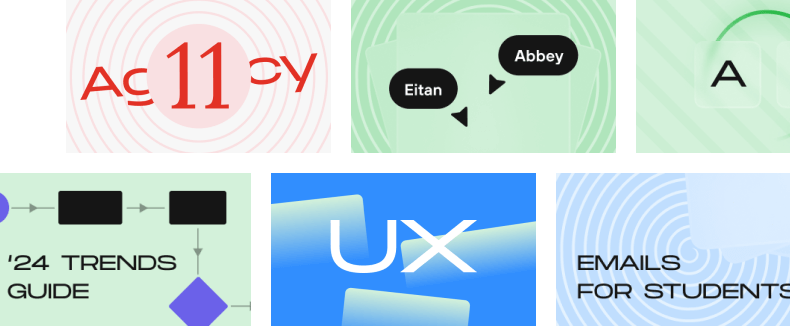
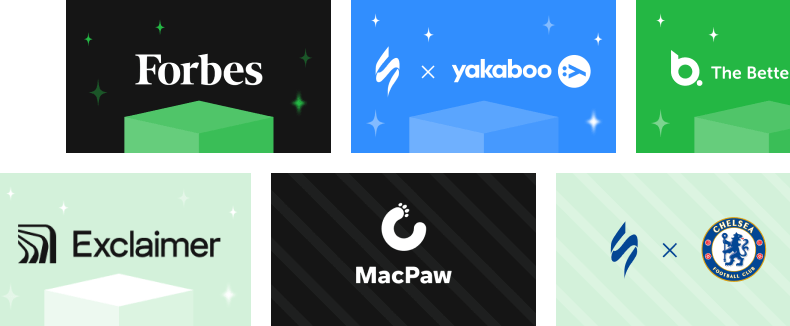






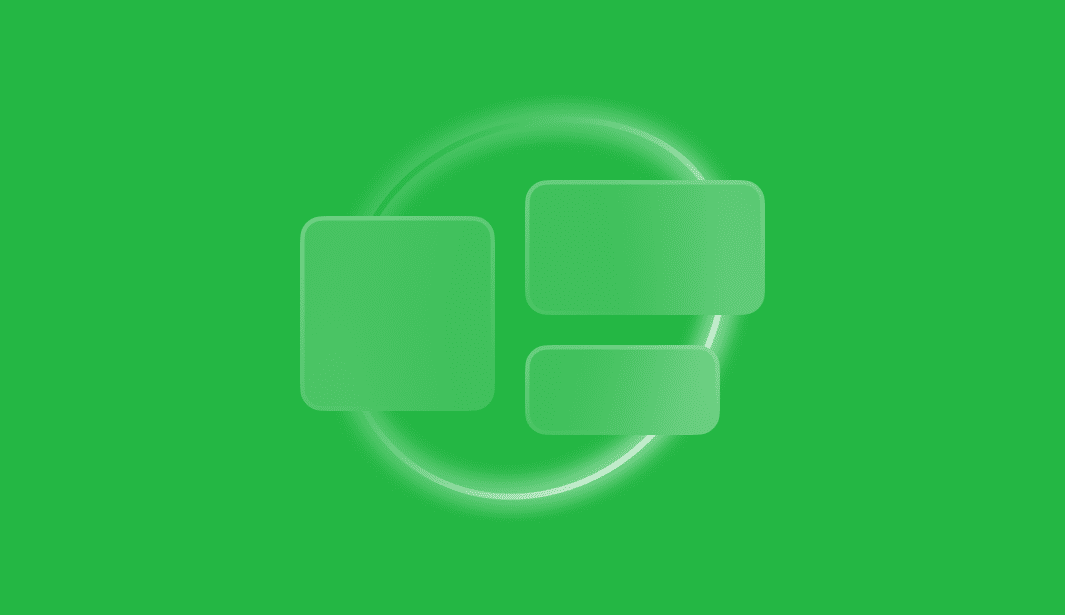
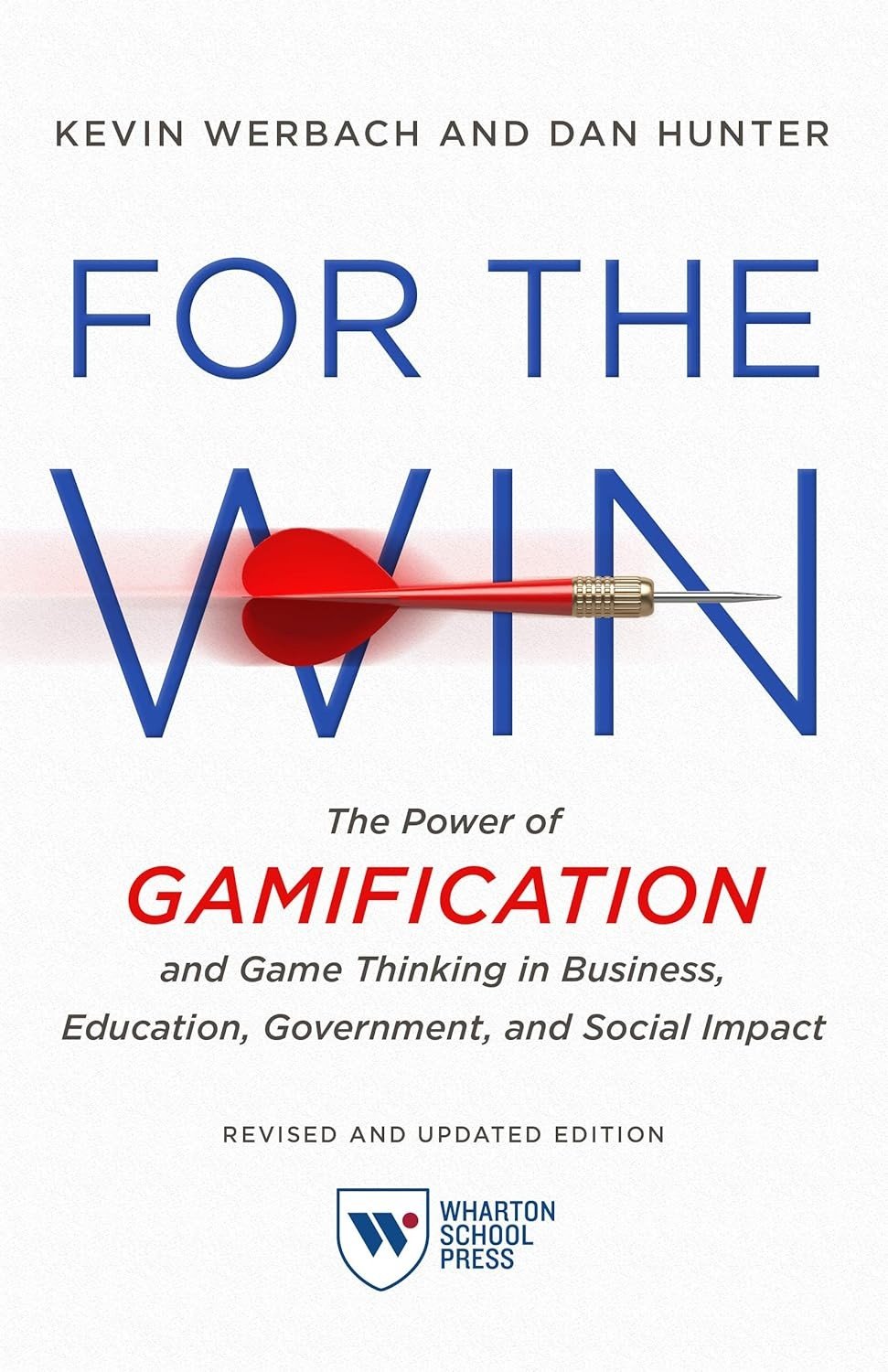

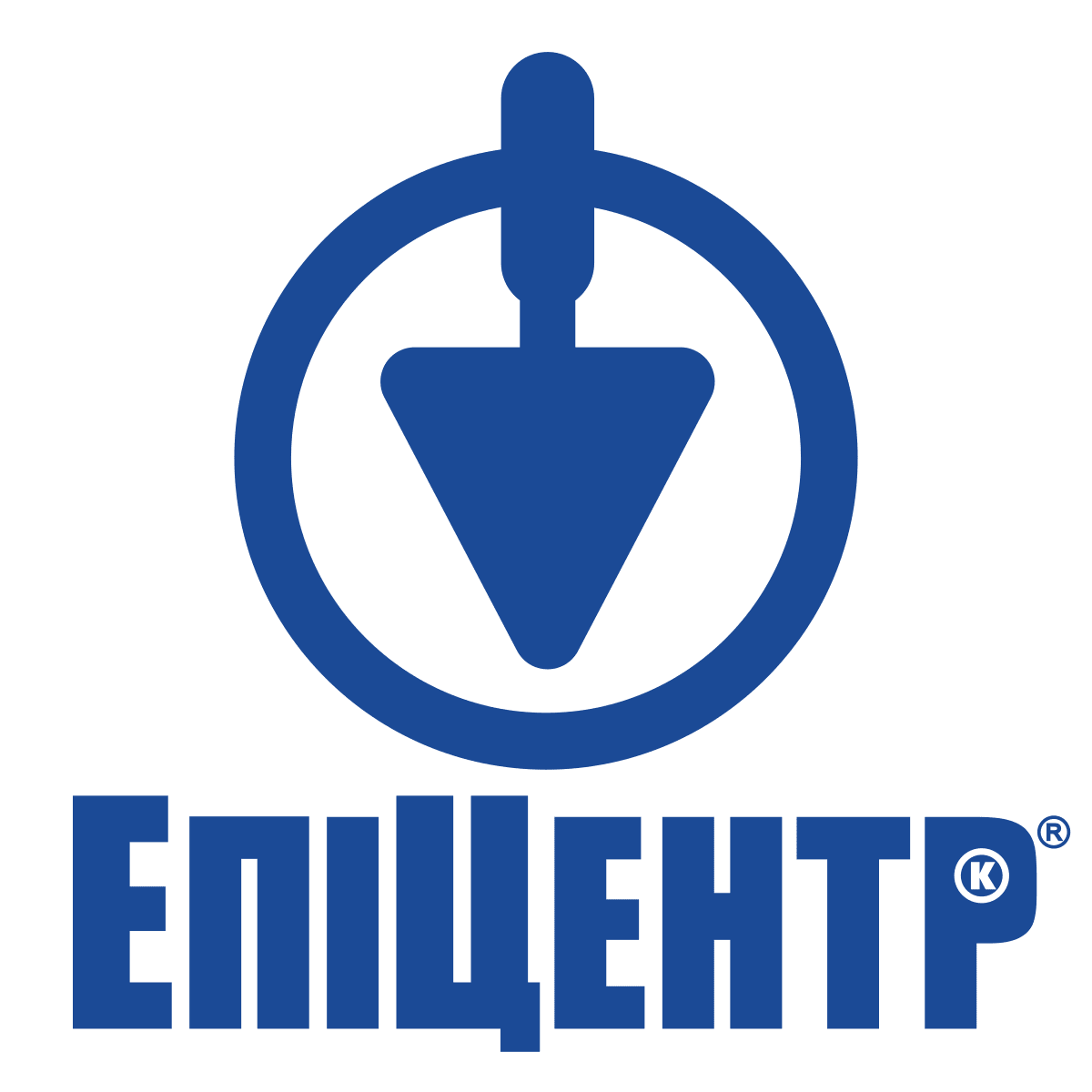


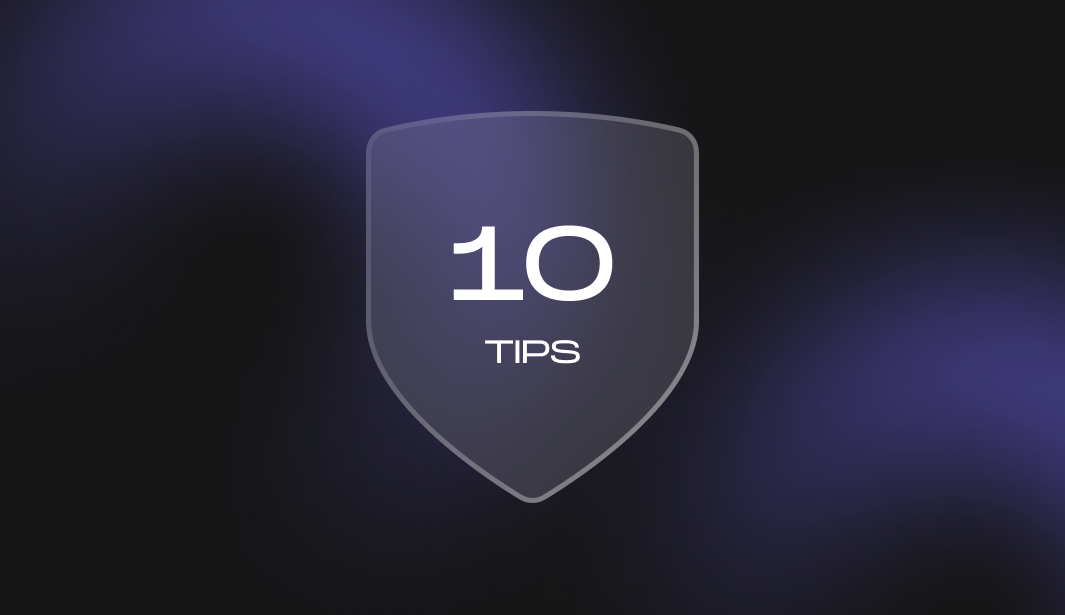

0 comments